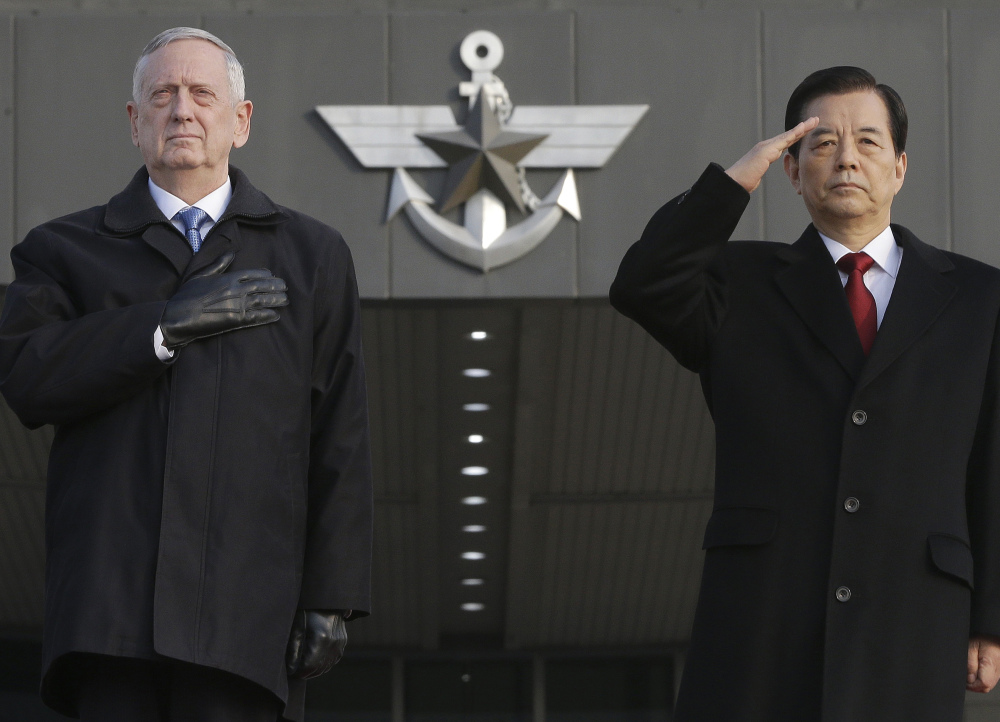Defense Secretary Jim Mattis will depart Tuesday on his first trip to Europe as Pentagon chief, meeting with defense ministers from numerous countries as Washington considers deploying thousands more troops to Afghanistan and altering its strategy to more aggressively counter the Islamic State.
The trip will include stops in Brussels to meet with European counterparts and in Germany to participate in the Munich Security Conference, a gathering of hundreds of ministers, heads of state and academics focused on bolstering global security.
In Brussels, Mattis also will host a separate meeting of senior officials in the coalition fighting the Islamic State, as the Pentagon works to provide a new plan to President Trump within weeks.
Defense officials have warned that no large policy changes are likely to be announced soon. Mattis is still in “listening mode,” said Navy Capt. Jeff Davis, a Pentagon spokesman.
“Look guys, he has been on the job for three weeks,” Davis told reporters Friday. “Please don’t ask for fully formed policies yet. That’s what he’s doing – he is in the process of learning so he can develop fully formed views on things.”
Still, major decisions are looming. Against the Islamic State, Mattis is expected to develop a set of recommendations that will be submitted to the White House by the end of the month. It could include changes to the rules of engagement under which U.S. troops fight, strategies to isolate the Islamic State through diplomacy, cyber-operations, the development of new partners to fight the militants and finding ways to cut off the group’s funding, according to a Jan. 28 executive order signed by Trump.
The United States currently has about 5,000 troops deployed to Iraq, with thousands of others supporting the effort against the Islamic State from nearby countries such as Kuwait and Qatar. Efforts to liberate the Islamic State’s two de facto capitals – Mosul in Iraq and Raqqa in Syria – are ongoing, with the eastern half of Mosul now freed and Raqqa surrounded from the north, west and south.
In Afghanistan, Army Gen. John Nicholson, the top commander of coalition troops, has identified a shortfall of a “few thousand” military advisers, he told the Senate Armed Services Committee on Thursday. Troops from the United States or NATO could fill the need, he said. There are about 8,400 U.S. troops in Afghanistan among a total coalition number of 13,300.
Nicholson testified Thursday that he is discussing options with other senior defense officials, including Mattis and Marine Gen. Joseph Dunford, the chairman of the Joint Chiefs. Senior U.S. officials, Nicholson said, will “be able to discuss” potential details about increasing the number of coalition troops in Afghanistan after Mattis returns from the meetings in Europe.
Copy the Story LinkSend questions/comments to the editors.



Success. Please wait for the page to reload. If the page does not reload within 5 seconds, please refresh the page.
Enter your email and password to access comments.
Hi, to comment on stories you must . This profile is in addition to your subscription and website login.
Already have a commenting profile? .
Invalid username/password.
Please check your email to confirm and complete your registration.
Only subscribers are eligible to post comments. Please subscribe or login first for digital access. Here’s why.
Use the form below to reset your password. When you've submitted your account email, we will send an email with a reset code.